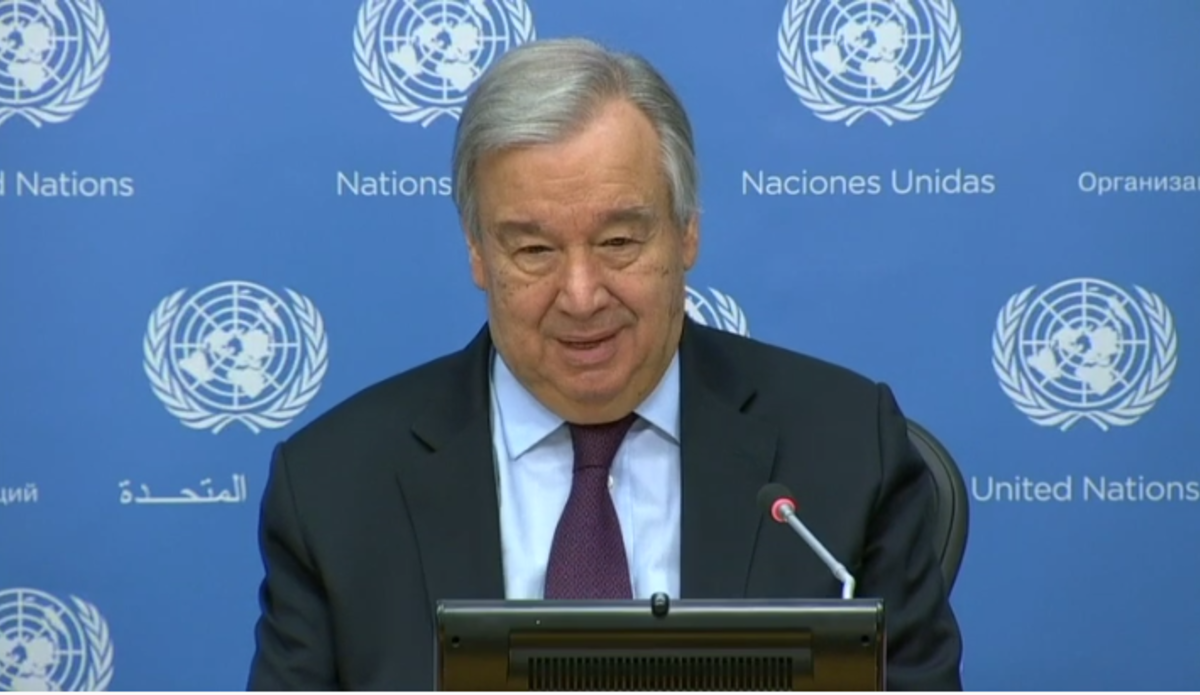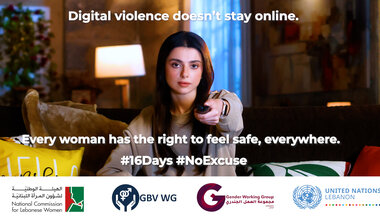Full transcript of UN Secretary-General's press encounter on the situation in the Middle East
The nightmare in Gaza is now entering an atrocious, abominable second year.
This has been a year of crises. Humanitarian crisis. Political crisis. Diplomatic crisis. And a moral crisis.
Over the last year -- following the horrific terror attacks perpetrated by Hamas on 7 October -- Gaza has become ground zero to a level of human suffering that is hard to fathom.
More than 41,000 [Palestinians] have been reportedly killed, mostly women and children. Thousands more are missing and believed to be trapped under the rubble.
Virtually the entire population has been displaced – and no part of Gaza has been spared.
Journalists have been killed at a level unseen in any conflict in modern times.
And humanitarians – those who have dedicated their lives to helping others – are facing unprecedented, epic dangers.
A record number – including so many members of our UN family -- have paid with their lives.
The vast majority of those killed were part of the backbone of humanitarian relief operations in Gaza -- UNRWA.
In the midst of all the upheaval, UNRWA -- more than ever -- is indispensable.
UNRWA -- more than ever -- is irreplaceable.
That’s why I have written directly to Israeli Prime Minister Benjamin Netanyahu to express profound concern about draft legislation that could prevent UNRWA from continuing its essential work in the Occupied Palestinian Territory.
Such a measure would suffocate efforts to ease human suffering and tensions in Gaza, and indeed, the entire Occupied Palestinian Territory.
It would be a catastrophe in what is already an unmitigated disaster.
Let’s be clear in practical terms what such a measure would mean.
Operationally, the legislation would likely deal a terrible blow to the international humanitarian response in Gaza.
UNRWA’s activities are integral to that response. It is not feasible to isolate one UN agency from the others.
It would effectively end coordination to protect UN convoys, offices and shelters serving hundreds of thousands of people.
Without UNRWA, the delivery of food, shelter and health care to most of Gaza’s population would grind to a halt.
Without UNRWA, Gaza’s 660,000 children would lose the only entity that is able to re-start education, risking the fate of an entire generation.
And without UNRWA, many health, education and social services would also end in the occupied West Bank, including East Jerusalem.
If approved, such legislation would be diametrically opposed to the UN Charter and in violation of Israel’s obligations under international law.
National legislation cannot alter those obligations.
And politically, such legislation would be an enormous setback to sustainable peace efforts and to a two-state solution – fanning even more instability and insecurity.
This draft legislation comes as the situation in which Gaza is in a death spiral.
The latest developments in the north are especially dire.
We are witnessing a clear intensification of military operations by Israel.
Residential areas have been attacked. Hospitals ordered to evacuate. And electricity cut off – with no fuel or commercial goods allowed in.
Around 400,000 people are being pressed yet again to move south to an area that is overcrowded, polluted and lacking the basics for survival.
Consider the situation for a family in the Jabalya refugee camp in the north.
They were ordered to leave their homes in October 2023.
Active operations subsided, and they returned.
They were once again ordered to evacuate in December 2023.
Active operations subsided, and they returned.
They were ordered again to evacuate in May 2024.
Active operations subsided, and they returned.
And just this month, they were once again ordered to evacuate.
The conclusion is clear: there is something fundamentally wrong in the way this war is being conducted.
Ordering civilians to evacuate does not keep them safe if they have no safe place to go and no shelter, food, medicine or water.
No place is safe in Gaza and no one is safe.
International law is unambiguous: civilians everywhere must be respected and protected – and their essential needs must be met, including through humanitarian assistance. All hostages must be released.
I strongly condemn all violations of International Humanitarian Law in Gaza.
Meanwhile, southern Gaza is overwhelmed.
Supplies are running low and Israeli authorities are only allowing a single, unsafe road for aid from the Kerem Shalom crossing, where humanitarians face active hostilities and violent, armed looting, fueled by desperation and the collapse of public order and safety.
I have warned for months of the risks of the conflict spreading.
The Middle East is a powder keg with many parties holding the match.
The situation in the occupied West Bank is boiling over.
Now, in Lebanon, attacks – including on civilians -- are threatening the entire region.
Over the last few days - exchanges of fire between Hizbullah and others in Lebanon and the Israel Defense Forces -- have intensified across the Blue Line, in total disregard of Security Council resolutions 1701 and 1559.
Large-scale Israeli strikes deep into Lebanon – including Beirut -- have killed more than 2,000 people over the last year – and 1,500 in just the past two weeks alone.
The toll has already surpassed the 2006 war in Lebanon.
Attacks by Hizbullah and others south of the Blue Line have killed at least 49 people over the last year.
Lebanese authorities report over one million people have been displaced in Lebanon – and 300,000 people have fled into Syria.
Over 60,000 people remain displaced from northern Israel.
Recently, the IDF started incursions across the Blue Line.
We are on the verge of an all-out war in Lebanon – with already devastating consequences. But there is still time to stop.
The sovereignty and territorial integrity of all countries must be respected.
Members of our own peacekeeping force in Lebanon -- UNIFIL – continue to carry out their mandates to the extent possible.
The mission relies on full compliance by all parties. I want to again express my gratitude and admiration to our peacekeepers and Troop Contributing Countries.
The men and women of UNIFIL are serving in what is today the most challenging environment for peacekeepers anywhere.
All actors must ensure their safety and security.
And we must do far more on the humanitarian front.
The US $426 million humanitarian aid appeal for Lebanon is only 12 per cent funded.
I urge donors to step up.
Dear ladies and gentlemen of the media,
The conflict in the Middle East is getting worse by the hour -- and our warnings about the horrific impacts of escalation keep coming to pass.
Every air strike, every missile launch, every rocket fired, pushes peace further out of reach and makes the suffering even worse for the millions of civilians caught in the middle.
That is why we cannot and will not give up on our calls for an immediate ceasefire both in Gaza and Lebanon, the immediate and unconditional release of hostages, and immediate lifesaving aid to all those who desperately need it.
That is why we cannot and will not give up on our calls for irreversible action for a two-state solution between Israel and Palestine.
All people in the region deserve to live in peace.
Thank you.
**Questions and Answers
Spokesperson: Thank you. Nabil?
Question: Thank you, Mr. Secretary-General. Nabil Abi-Saab, Al Araby TV Station. Yesterday, the Iranian foreign minister in Beirut said for the ceasefire to take place in Lebanon, it should first take place in Gaza. Do you think this is a constructive position and helps to reach a political solution? And what's the first step about 1701, the roadmap to implement 1701? What should be the first step?
Secretary-General: We are asking for a ceasefire both in Gaza and in Lebanon.
Spokesperson: Thank you. Yvonne Murray, Irish Television.
Question: Thank you very much, Secretary-General. Yvonne Murray, RTE News. My question is about you mentioned UNIFIL and the peacekeepers there. As you know, the Israeli army, the IDF, has set up a firing position right adjacent to Outpost 652 where Irish soldiers are currently stationed. What are your concerns now as the fighting moves northwards towards larger UNIFIL camps?
Secretary-General: We are naturally very concerned. Yesterday, I had the chance to speak with your prime minister, and after that I did a number of demarches with different entities. And I can now tell you that those Israeli tanks and other armed elements that were around the 652 position have left.
And I strongly appeal to both parties to fully respect the safety and security of UNIFIL.
Spokesperson: Thank you very much.
Secretary-General: Thank you. Thank you very much.
 UN
UN





